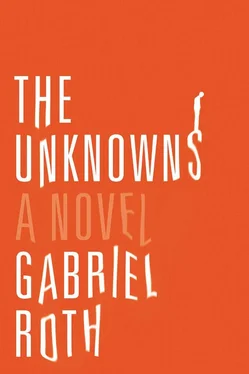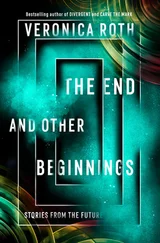I peered through the narrow window in the door. Guy Learmont, who was tiny and in my Spanish class, was watching a kid I didn’t know play Toxic Ravine at a terminal on the far side of the room. In the months before I’d started at MLK I had imagined the inside of the building, the other students, the adult life I would finally achieve there. This fantasy, vague as to details but emotionally vivid and specific, had withdrawn from my consciousness the minute I stepped through the doors of the real place. But it had survived, undiminished, as though sealed in an airtight compartment in my brain, and now, in a gust of nostalgia for a world that would never exist, it returned. I mourned it for a second, and then I said goodbye and pushed open the door to the computer room.
“Fuck, it’s Muller,” Guy Learmont said as I walked in. Near the beginning of the year, Learmont had made the mistake of confiding in Jerry Osteen, and now the entire school knew he had only one testicle. Bill Fleig, typing rapidly at a terminal in the corner, didn’t look up.
Brilliant white paint coated the walls, the pipes, the light fixtures, thick enough to give the room an alkaline scent. There were seven free computers, each with twelve times as much memory as the Packard Bell in my bedroom. Learmont’s friend’s machine emitted happy music and occasional shouts of “I’m hungry!” Thickets of code ran down Bill Fleig’s screen.
“It’s a test generator,” Bill said, although I hadn’t asked. “People were cheating in Gestetner’s class, copying each other’s homework and stuff, so he asked me to write a program that generates a different test for everybody. It just varies up the quantities and shuffles the order of the questions, and then it generates an answer key for each one.”
“Gestetner couldn’t do this himself?” I asked.
“No, he could,” Bill said. “But he has to give me some kind of homework if I’m going to get AP credit for learning C++.” Then he stopped typing and turned to look at me. “Is it true you were keeping a notebook on girls?” If the story had made it to Bill, who was earning extra credit constructing cheat-proof tests for a math teacher, everyone in the school had heard it.
“Fuck you,” I said. Bill observed this display of emotion curiously. “OK, yes. Yeah, it’s true. I was keeping a notebook.”
“I was just wondering,” Bill said. “I can see why you might do that.”
Something hateful in my gut rose up against him: of course the only person in the school with any sympathy for me was Bill Fleig, he of the overbite and the giant calculator. “I’m really glad I’ve got your support,” I said.
A muffled stampede shook the ceiling: lunch was over. Bill saved his program to a floppy disk, Learmont and his friend shut down their game, and I followed them out. In the first-floor hallway, on my way to world history, someone called my name and started to cheer. It spread, and soon dozens of kids had turned from their lockers and started to applaud, as though I was the hero at a parade. It wasn’t about anything, just the crowd enjoying its capacity for spontaneous mass irony. I tried to play along, raising my hand to acknowledge the tribute, until someone behind me gave me a shove and I went down, stinging my palms on the linoleum.
I went back to the computer room the next day, and Bill showed me how the test generator worked. Then he announced that he’d started building a spreadsheet program. “Every few years a new one comes along and demolishes the old one,” he said. “VisiCalc got creamed by Lotus 1-2-3, Lotus got eaten by Excel, now I’m going to beat Excel.”
I looked at his designs: he had some clever ideas for macro functions that Excel wouldn’t have for three or four years, but he hadn’t thought much about user experience. I made some tentative suggestions, careful to show respect for the work he’d put in. Like most people who are confident of their genius, Bill accepts thoughtful criticism eagerly, and so I spent a few days thinking through the interface for him, mapping it out on paper in classes and at night. I could already tell it was the only area in which I might improve on Bill’s work. Most software makes people struggle, and so when they notice it they see it as an enemy. But if the designer can anticipate not only the user’s goals but the user’s instincts and assumptions, users will feel that the software cares about them, pays attention to their needs — loves them. And they’ll start to love the software back. All feelings of love toward technology are this kind of reciprocal love, I think.
I designed the user experience model and most of the front end for the spreadsheet program, and watched as Bill built it. That’s how I learned how good Bill Fleig was. Faced with a troublesome bug, he didn’t scroll through the program’s text to follow a variable’s path but stared blankly ahead, nodding, unspooling hundreds of lines of code in his mind, as though the only processor he needed was his own cerebral cortex. At the lowest point in my life I had found a friend to explore this new territory with, although it wasn’t the friend or the territory I would have chosen.
(We finished the program eight months later. Bill sent demos to software publishers, all of whom said the spreadsheet market was oversaturated. I happen to know that a copy of the demo made it to Redmond about two years before features we’d designed showed up in Excel, with the interface completely botched.)
Outside the computer room things changed without getting better or worse. The applause thing became a daily occurrence, then gave way to a variant in which people I passed in the halls slapped me on the back. It was as though they were congratulating me, but painfully hard and with sarcastic intent. Everyone who attends high school has seen this kind of thing happen, but little in the adult world resembles it, and so for most adults the cruelty of adolescence is a half-remembered dream, a vague and tumultuous carnival with no associative triggers to connect it to present experience.
By that point my notebook wasn’t mentioned much — the schoolwide conversation had moved on. (There were exceptions: once, on the stairway, Barry Cushman said, “Hey Eric, is Monica in your notebook?” and Monica Hintz said, “Shut up, jerk!” and pushed Barry into the wall, but she was smiling while she said it, and I realized that this was how flirting worked.) But it was freshman year, and the class of 1996 needed a pariah, and I had stepped forward to volunteer.
I spent weekends in my room, hacking away on my computer, wishing I had more RAM or some friends. Around me people were starting to sleep together, and to talk about it, and I spent more and more time and energy imagining sex, guessing at what it might be like, wondering if I’d ever find out.
If I cut loose, I’ll revert to the animal side o’ my nature — so totally that I may never regain my humanity.
— Wolverine, X-Men 147
THE SECOND DATE WITH Maya is a daytime triumph in which we sit side by side in lawn chairs on the roof of my building, looking out at other people’s roofs, passing a bottle of wine. The gravel crunches beneath our sneakers. In the thorny zone of potential disillusion that follows a first kiss, we effortlessly sustain our conversational momentum, right up until I ask what her parents do.
“Uh, my dad’s an art dealer,” she says, her hands tucked into the sleeves of her jacket. “My mom died when I was six.”
The imperatives here are multiple and contradictory: I don’t want to drag her into self-exposure, or spoil the afternoon with grief, but I can’t allow myself to appear cowardly in the face of tragedy. “How did she die?”
“She had cancer,” Maya says, nestling the wine bottle into the pebbles. “Two kinds of cancer at once. She was being treated for lung cancer when they found the stomach cancer.”
Читать дальше












